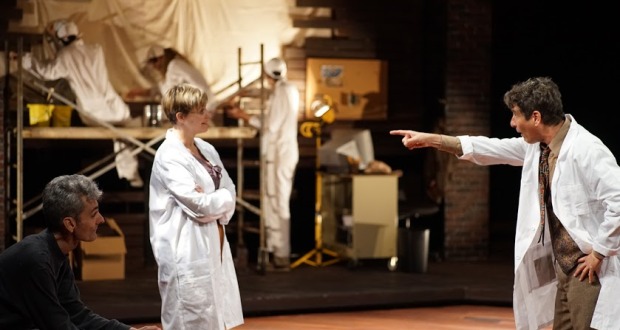Pros: An interesting take on a young nation trying to make its way post-Soviet domination.
Cons: Too long, and heavy with convoluted dialogue. A laudable attempt to capture a nation’s response to political freedom, but does not entertain or inform to any real degree.
Summary
Rating
Poor
Having never been to the Cockpit Theatre before, I expected a tight performance area; the facade was the proverbial hole in the wall, but the interior was surprisingly spacious with good sight lines of the stage in the round. Part of a trilogy of plays, Pentecost tells the story of Gabriela Pecs, a government official in a small, unnamed ex-Soviet Union country. Gabriela believes she has discovered a rare artefact in an abandoned cathedral near one of the country’s borders. Upon learning that Oliver Davenport, a prominent art historian from England is to deliver a lecture, she intercepts him. From here, they go on an impromptu tour through her country’s history, heritage and politics.
Early exchanges between Gabriela and Oliver refer to a nation trying to find its own identity. The author wisely avoids naming the country or even assigning a fictitious name; the programme lists key political events in Eastern Europe and seems apparent that the characters could be discussing any former Soviet bloc country. So the country seems becomes the everyman of Eastern Europe and a reflection of ordinary people living in troubled regions. But that wasn’t necessarily how the story played out. Gabriela and Oliver were followed by a succession of characters each delivering their own speech about Eastern European politics and the significance of a fresco that might (or might not) make the country more than just a dot on the map. Dr Leo Katz, an American academic enters the fray; as does the Mayor, Interior Minister, Catholic priest, Eastern Orthodox minister and a local magistrate. They eulogise and pontificate but never quite connect with each other or the overall story line. The dialogue stretched out so far I began to lose concentration. It subsequently became difficult to focus on the story. I wanted to see characters develop past the stage of just making political statements but it never really happened.
The play has its moments, and occasionally can be powerful, particularly as disaffected nationals takes over the church and holds Gabriela and Oliver hostage. The author is telling a familiar story to the audience and therein lies the problem. Pick up any newspaper, turn on the TV or radio and Eastern Europe is a current, live topic – it always has been and always will be, so any play dealing with the issue has to say something new or present the issue in a different way. The authenticity of a church fresco isn’t a strong enough symbol or euphemism for a nation finding its way in the world. The tone felt slightly preachy and it seemed the audience were being patronised. If I’m not entertained by the piece then I expect to be informed or educated; this play did neither for me. The cast were solid players and Brian Lindon was particularly engaging as Dr Leo Katz; but ultimately I felt the play was much too hard a work for both cast and audience.
Author: David Edgar
Director: Jerome Davis
Producer: Burning Coal Theatre Company
Box Office: 0207 258 2925
Booking link: http://tickets.thecockpit.org.uk/Sales/Shows/Pentecost#book
Booking until: 30 November 2014
 Everything Theatre Reviews, interviews and news for theatre lovers, London and beyond
Everything Theatre Reviews, interviews and news for theatre lovers, London and beyond



